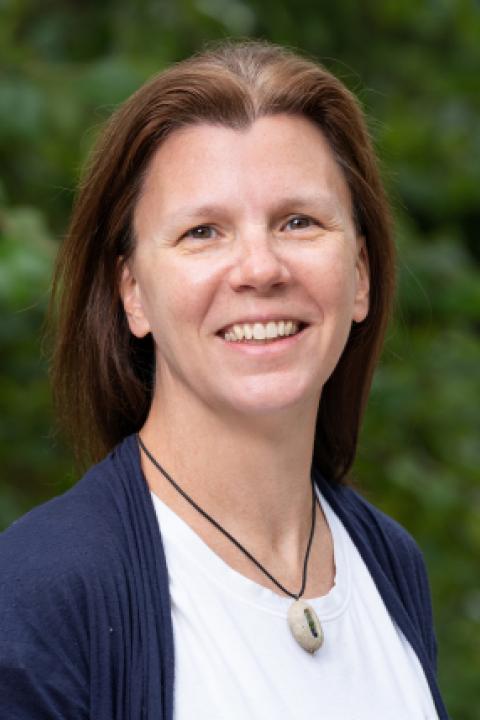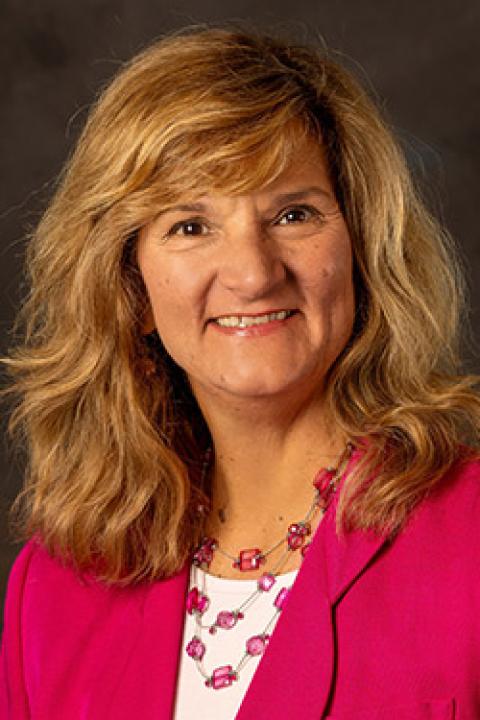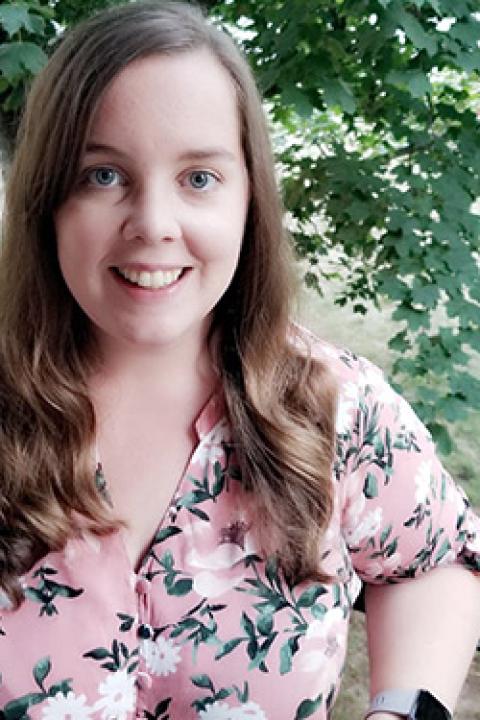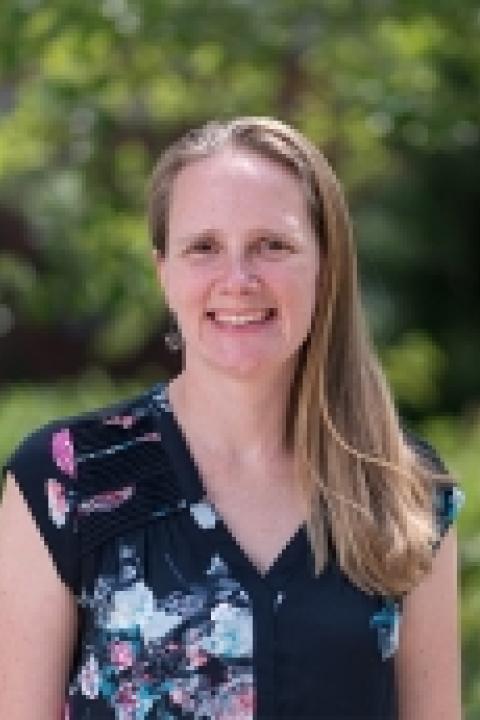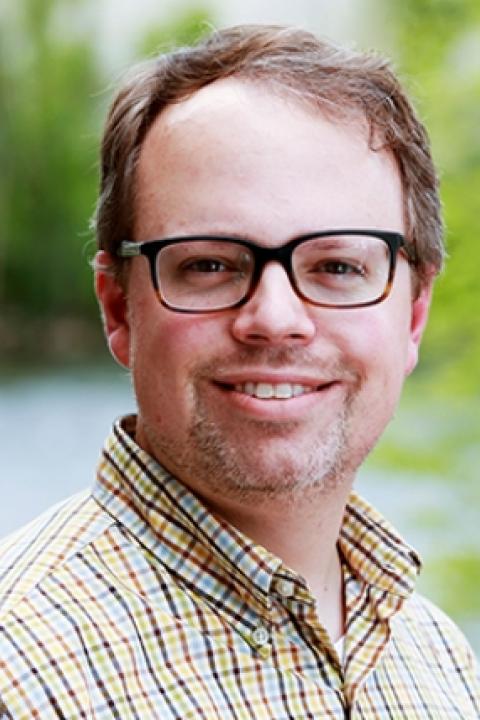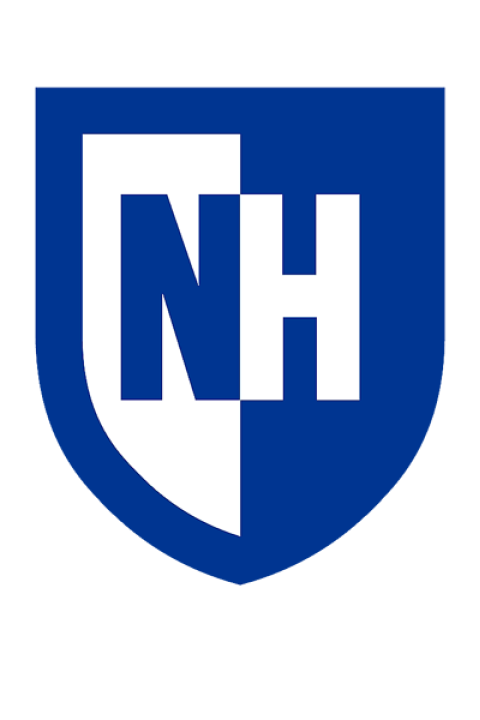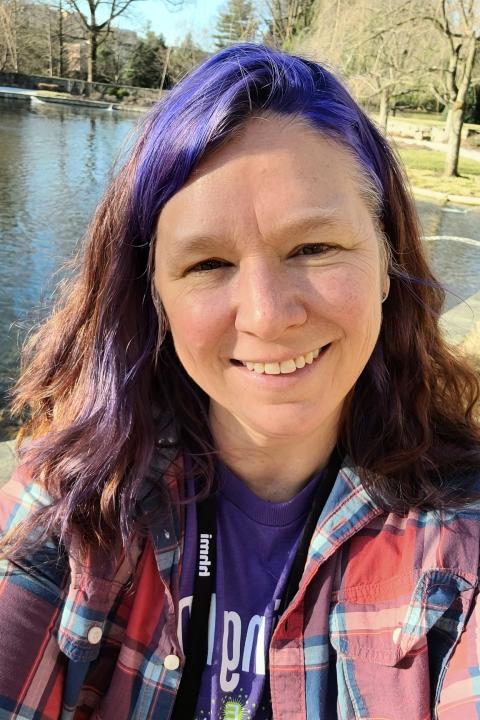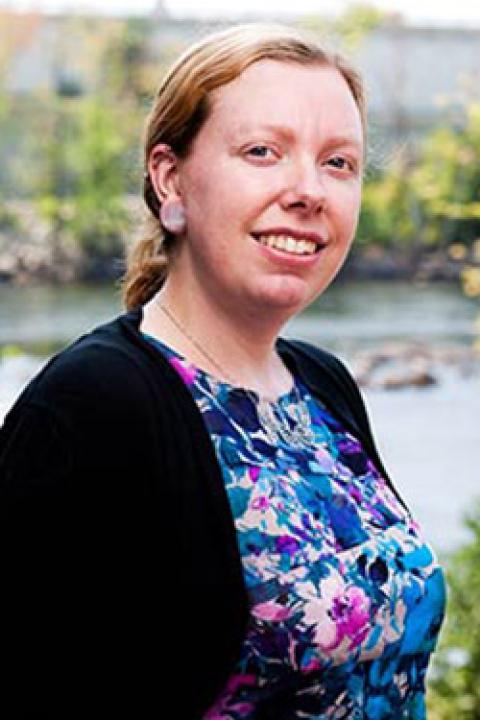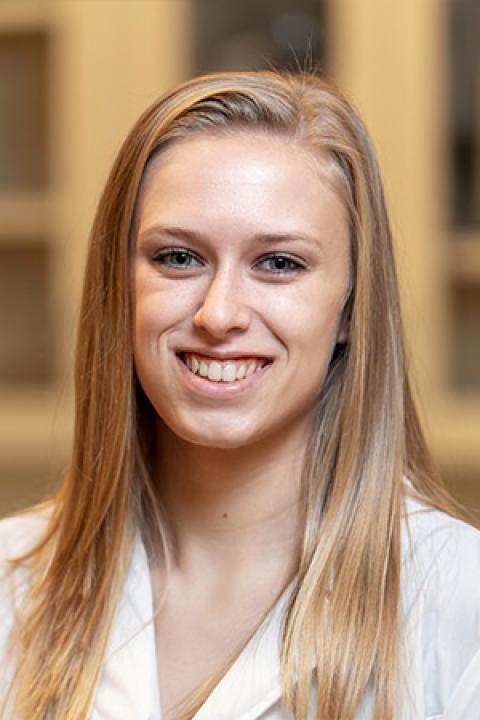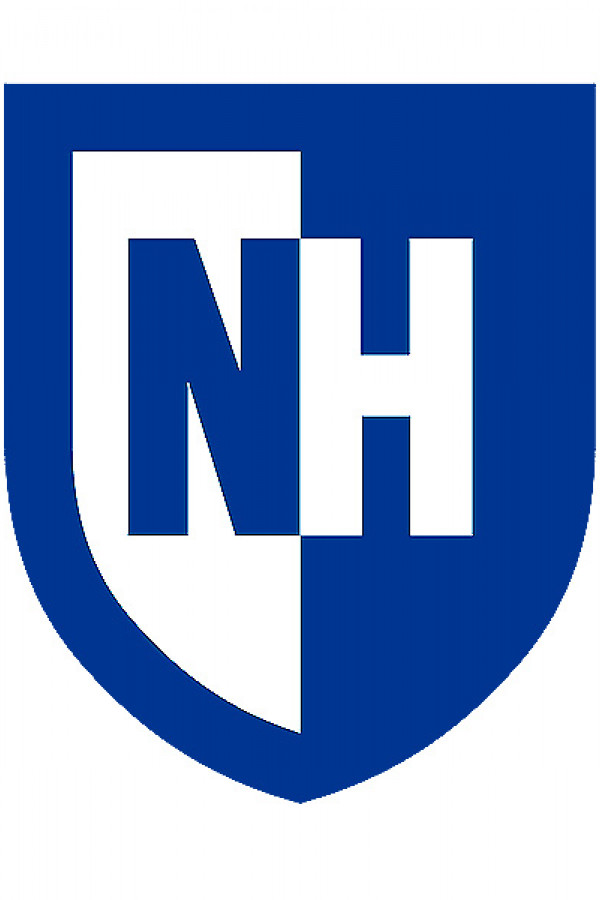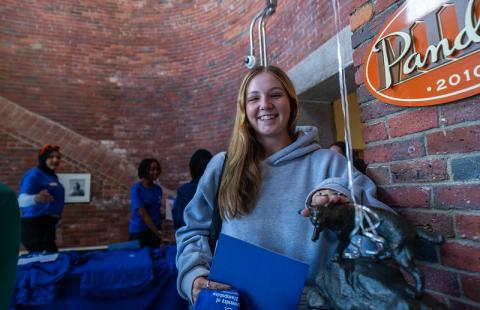Explore the living world through hands-on experience in the lab and in the field
Discover the inner workings of living organisms from molecules to ecosystems in our biological sciences program. As our largest and most popular major, the biological sciences program is designed to give you the degree you want — through self-designed concentrations, independent study, research projects, internships, job shadows and more. You can also tailor your biological sciences degree toward pre-health and pre-med to help you meet requirements for medical school or graduate programs.
What is biological sciences?
Biology is the study of life, exploring how living organisms from microbes to animals to ecosystems interact with one another and the environment. The biological sciences program builds a foundation in topics like evolution, microbiology, molecular and cellular biology, biodiversity and more. Through diverse areas of study and hands-on experience, biological sciences students will be prepared for careers in industries from healthcare to agriculture to education, or for further education in graduate, medical or veterinary school.
Why study biological sciences at UNH Manchester?
UNH Manchester’s largest and most popular major, the biological sciences program is designed to give students the skills and hands-on experience for careers or further education in a range of competitive fields. Experiential learning is central to this program—students work side-by-side with faculty on research projects in our state-of-the-art labs and get real-world experience through internships and job shadows. With student-designed concentrations spanning areas such as biology teaching, genomics, ecology, microbiology, pre-professional health and more, biological sciences majors can customize their degrees for the future they want.
Potential careers
- Dentist
- Doctor of Medicine
- Occupational or Physical Therapist
- Optometrist
- Pharmacist
- Physician Assistant or Pathologists’ Assistant
- Professor
- Research Technician
- Science Teacher
- Veterinarian
The Millyard Scholars Program provides scholarships, research opportunities and distinctive academic programming to exceptional incoming biological sciences students. Learn more and apply
The industry-focused M.S. in Biotechnology: Industrial and Biomedical Sciences combines skill-based training in our state-of-the-art labs and innovative experiential learning opportunities with local companies in the biotechnology, pharmaceutical and medical technology fields. Qualified students can earn a B.S. and M.S. in just five years by taking graduate-level courses during senior year. Learn more
Curriculum & Requirements
Biology is the study of living organisms in both laboratory and field conditions. It concerns itself with questions of understanding the living world, its complex interrelationships, and the role of human beings within it.
The B.A. in biological sciences at UNH Manchester is designed to:
- allow students to earn a baccalaureate degree in biology at UNH Manchester;
- allow students to combine study in biology with other programs and disciplines by completing a second major, a minor, or a self-designed set of elective courses along with their biology degree;
- provide an opportunity for students to complete a baccalaureate degree in biology while preparing to pursue a Master's degree in biology, biotechnology, or other fields. These degree programs could be undertaken after completion of the B.A. Alternatively, UNH offers several accelerated Master's programs where excellent senior students in the Biological Sciences major can complete coursework towards their undergraduate and graduate degrees at the same time;
- allow students to complete a major in biology while taking required courses in education in preparation for the five-year M.A.T. or M.Ed. programs and state certification in secondary science education; or alternative state certification pathway;
- provide an opportunity for students to complete a baccalaureate degree in biology while completing the required courses for admission to medical, dental, veterinary, physician assistant, pharmacy, physical therapy, optometry, and other professional or graduate programs.
Employment opportunities in the public and private sectors include education; industrial, clinical, and research laboratories; biotechnology; and environmental field research.
For more information, contact the Office of Admissions, (603) 641-4150.
Sample Course Sequence
| First Year | ||
|---|---|---|
| Fall | Credits | |
| BIOL 413 | Principles of Biology I | 4 |
| CHEM 403 | General Chemistry I | 4 |
| ENGL 401 | First-Year Writing | 4 |
| MATH 418 | Analysis and Applications of Functions | 4 |
| UMST 401 | First Year Seminar | 2 |
| Credits | 18 | |
| Spring | ||
| BIOL 414 | Principles of Biology II | 4 |
| CHEM 404 | General Chemistry II | 4 |
| PSYC 402 | Statistics in Psychology | 4 |
| Discovery Course | 4 | |
| Credits | 16 | |
| Second Year | ||
| Fall | ||
| BIOL 541W | Ecology | 4 |
| Foreign Language I | 4 | |
| Discovery Course | 4 | |
| Discovery Course | 4 | |
| Credits | 16 | |
| Spring | ||
| BMS 503 & BMS 504 | General Microbiology and General Microbiology Laboratory | 5 |
| GEN 604 | Principles of Genetics | 4 |
| Foreign Language II | 4 | |
| Discovery Course | 4 | |
| Credits | 17 | |
| Third Year | ||
| Fall | ||
| 600/700 Biological Concentration | 4 | |
| Discovery Course | 4 | |
| Elective Course | 4 | |
| Elective Course | 4 | |
| Credits | 16 | |
| Spring | ||
| 600/700 Biological Concentration | 4 | |
| Discovery Course | 4 | |
| Elective Course | 4 | |
| Elective Course | 4 | |
| Credits | 16 | |
| Fourth Year | ||
| Fall | ||
| 600/700 Biological Concentration | 4 | |
| Capstone | 4 | |
| Elective Course | 4 | |
| Elective Course | 4 | |
| Credits | 16 | |
| Spring | ||
| 600/700 Biological Concentration | 4 | |
| BSCI 701 | Senior Seminar I | 1 |
| Elective Course | 4 | |
| Elective Course | 4 | |
| Elective Course | 1 | |
| Credits | 14 | |
| Total Credits | 129 | |
Degree Requirements
All Major, Option and Elective Requirements as indicated.
*Major GPA requirements as indicated.
Major Requirements
Each course required in the major must be completed with a minimum grade of C-. Students must attain a minimum GPA in the major of 2.0. Transfer students must complete at least 24 credits in the major at UNH. BIOL 413 Principles of Biology I, BIOL 414 Principles of Biology II may be used to satisfy the biological sciences Discovery requirement and CHEM 403 General Chemistry I, CHEM 404 General Chemistry II may be used to satisfy the Physical Sciences Discovery requirement. PSYC 402 Statistics in Psychology may be used to satisfy the Quantitative Reasoning Discovery requirement; however, students interested in graduate or professional programs are encouraged to take MATH 425 Calculus I, or MATH 424B Calculus for Life Sciences, to satisfy the Quantitative Reasoning requirement.
The UNH Manchester B.A. in biological sciences program is structured with three levels of coursework.
| Code | Title | Credits |
|---|---|---|
| Biology Courses | ||
| BIOL 411 | Introductory Biology: Molecular and Cellular | 4 |
| or BIOL 413 | Principles of Biology I | |
| BIOL 412 | Introductory Biology: Evolution, Biodiversity and Ecology | 4 |
| or BIOL 414 | Principles of Biology II | |
| BMS 503 & BMS 504 | General Microbiology and General Microbiology Laboratory | 5 |
| BIOL 541W | Ecology | 4 |
| GEN 604 | Principles of Genetics | 4 |
| Chemistry Courses | ||
| CHEM 403 & CHEM 404 | General Chemistry I and General Chemistry II | 8 |
| Mathematics Courses | ||
| Select one of the following: | 4 | |
MATH 418 | Analysis and Applications of Functions | |
MATH 425 | Calculus I | |
MATH 424B | Calculus for Life Sciences | |
| Statistics Course | ||
| PSYC 402 | Statistics in Psychology | 4 |
| or BIOL 528 | Applied Biostatistics I | |
| or BUS 430 | Introduction to Business Statistics | |
| Total Credits | 37 | |
Self-Designed Concentration in Biology
Students will select, in consultation with their advisor, four biology courses at the 600-700 level to be taken at UNH Manchester or UNH Durham.
Capstone Experience
| Code | Title | Credits |
|---|---|---|
| BSCI 701 | Senior Seminar I (during either semester of senior year) 1 | 1 |
| In consultation with your academic advisor, select a capstone experience: | 4 | |
BSCI 792 | Research | |
BSCI 793 | Internship | |
BSCI 795 | Independent Study | |
| Total Credits | 5 | |
- 1
BSCI 701 will meet weekly during either semester of the senior year in a seminar format. Students will share information about capstone experiences, listen to presentations on timely issues in biology, develop career preparation skills, and receive training in poster production. Other methods of oral presentation and scientific writing are explored as students prepare to present the results of their capstone activities at the Undergraduate Research Conference or other venues.
In addition, all students will take elective courses to fulfill the 128-credit requirement for a B.A. degree. These elective courses could fulfill the requirements for a major or minor in another program or they could fulfill a self-designed interdisciplinary concentration. Where appropriate, a student could include some of the biology-related supporting science courses listed above. These courses would be selected in consultation with the advisor and the appropriate faculty advisor in another program.
Depending on specific academic and career goals, in particular, students preparing for professional or graduate programs, may, in consultation with their advisor, elect to take additional supporting science courses such as:
| Code | Title | Credits |
|---|---|---|
| CHEM 545 & CHEM 546 | Organic Chemistry and Organic Chemistry Laboratory (one semester) | 5 |
| CHEM 651 & CHEM 653 | Organic Chemistry I and Organic Chemistry Laboratory (two semesters) | 5 |
| CHEM 652 & CHEM 654 | Organic Chemistry II and Organic Chemistry Laboratory (two semesters) | 5 |
| BMCB 658 & BMCB 659 | General Biochemistry and General Biochemistry Lab | 5 |
| MATH 426 | Calculus II | 4 |
| PHYS 401 | Introduction to Physics I | 4 |
| PHYS 402 | Introduction to Physics II | 4 |
These courses are often required for admission to medical, professional, and other graduate programs. Medical and dental graduate schools also require PSYC 401 Introduction to Psychology and SOC 400 Introductory Sociology.
Program Learning Outcomes
A student successfully completing the Biological Sciences program will be able to:
- Understand the fundamentals of basic biological principles, concepts, and theories.
- Demonstrate the ability to evaluate, apply, and synthesize biological information and ideas.
- Be competent in basic biology and chemistry laboratory skills and with the use of common laboratory equipment and instrumentation.
- Demonstrate the ability to communicate technical information related to biological sciences related topics in scientific writing and oral presentations.
- Understand, analyze, and evaluate primary research literature involving biological sciences related topics.
- Understand and apply the process of the scientific method, including being able to formulate hypotheses, design and conduct experiments with adequate controls to test hypotheses, interpret and evaluate data, and draw conclusions.
- Gather, analyze, organize, evaluate, and present scientific data, including the use of technology to solve problems and communicate information.
- Demonstrate the ability to function as a member of a team.
- Compete effectively for entry-level employment and for admission to graduate or professional schools in their chosen area and be successful in these endeavors.
Explore Program Details
-
Associate ProfessorAssociate Professor of Biological Sciences and of BiotechnologyAffiliate Faculty Member, Hubbard Center for Genome StudiesEmail: Kyle.MacLea@unh.eduPhone: (603) 641-4129
-
Adjunct Faculty
-
Adjunct Faculty
-
Adjunct Faculty
Because of the popularity and size of our biological sciences program, we’ve more than doubled our laboratory space. You’ll get hands-on experience in our seven state-of-the-art laboratories: general biology, advanced biology, microbiology, general chemistry and organic chemistry, as well as the cell culture research lab and microbiology research lab.
Labs are stocked with the latest, cutting-edge equipment and are taught by residential faculty or experienced instructors, all of whom specialize in their discipline.
Our biological sciences program prepares you for graduate or professional studies, or for a career in the laboratory, conference room, lecture hall, surgical suite or more – the choice is yours. The Bureau of Labor Statistics projects positive growth in biological sciences professions between 2012 and 2024, translating to vast possibilities for your future.
Job Title |
Job Growth |
Average Salary |
| Agricultural and Food Scientist | 5% | $62,470 |
| Biochemist | 8% | $82,150 |
| Biological Science Teacher, Postsecondary | 13% | $72,470 |
| Biological Technician | 5% | $41,650 |
| Dentist | 18% | $158,310 |
| Environmental Scientist | 11% | $67,460 |
| Forensic Science Technician | 27% | $56,320 |
| Medical and Clinical Laboratory Technologist | 16% | $50,550 |
| Medical Scientist | 8% | $82,240 |
| Microbiologist | 4% | $67,550 |
| Natural Sciences Manager | 3% | $120,160 |
| Occupational Therapist | 27% | $80,150 |
| Optometrist | 27% | $103,900 |
| Pharmacist | 3% | $121,500 |
| Physician or Surgeon | 14% | $187,200 |
| Physician Assistant | 30% | $98,180 |
| Veterinarian | 9% | $88,490 |
The industry-focused M.S. in Biotechnology: Industrial and Biomedical Sciences combines skill-based training in our state-of-the-art labs and innovative experiential learning opportunities with local companies in the biotechnology, pharmaceutical and medical technology fields. Qualified students can earn a B.S. and M.S. in just five years by taking graduate-level courses during senior year. Learn more
Our campus is in the heart of the region’s cultural, economic, entertainment and government activity — putting unlimited internship opportunities at your doorstep. We’ve partnered with local businesses to give you the real-world experience that sets you apart. Biological sciences majors have interned at many high-profile organizations in the area, including:
- Concord Hospital
- Manchester Water Works
- New Hampshire Audubon Society
- Normandeau Associates
We've partnered with Elliot Hospital to offer a robust job shadow at the Elliot Laboratory. Faculty members will select two students each spring and fall semester to participate in the shadow, which gives students hands-on experience in each section of the medical lab.
UNH has partnered with the Shoals Marine Laboratory (SML) to offer summer undergraduate courses and research internships at the SML field station in Kittery, Maine. With courses like marine mammal biology, wildlife forensics and underwater research, students get land- and boat-based experience in the field. SML credits can be applied toward your biological sciences major requirements.
Advising is available for UNH students, alumni, and post baccalaureates pursuing health professional careers. The Pre-Health Advising Office provides support throughout the process of preparing for health professions school from advising on the courses they should take to helping navigate through the complex steps of the application process.
UNH Manchester has a unique articulation agreement with Massachusetts College of Pharmacy and Health Sciences (MCPHS) University that allows you to earn your B.A. in biological sciences from UNH Manchester plus a Master of Physician Assistant Studies or Doctor of Pharmacy degree from MCPHS’s Manchester campus.
While pursuing your bachelor’s at UNH Manchester, you’ll work closely with your advisor to make sure you complete prerequisites for the Master of Physician Assistant Studies program at MCPHS University. Each academic year, the most competitive students (top six) are given preferential consideration for admission to the M.P.A.S. program. Upon completing your UNH degree requirements, you’ll transfer to MCPHS’s Manchester campus to complete the 24-month M.P.A.S. degree.
Already earned a bachelor’s degree at UNH or another college? You can still complete MCPHS’s M.P.A.S. program prerequisites at UNH Manchester. Transfer students are not eligible for the collaborative program but may apply through MCPHS’s regular admission process.
To get your Doctor of Pharmacy degree, you’ll complete three years of study in UNH Manchester’s pre-pharmacy track then transfer to MCPHS’s Manchester campus to fulfill your remaining bachelor’s requirements and complete the accelerated Doctor of Pharmacy degree. Each academic year, the most competitive (top six) biological sciences students are given preferential consideration for admission to the accelerated professional phase of MCPHS’s Pharm.D. program. As part of this articulation agreement, all prerequisite courses must be taken at UNH’s campuses in either Manchester or Durham.
In partnership with the New Hampshire community colleges below, we've developed a pathway to show you which courses at your community college will transfer into UNH Manchester's biological sciences program.


